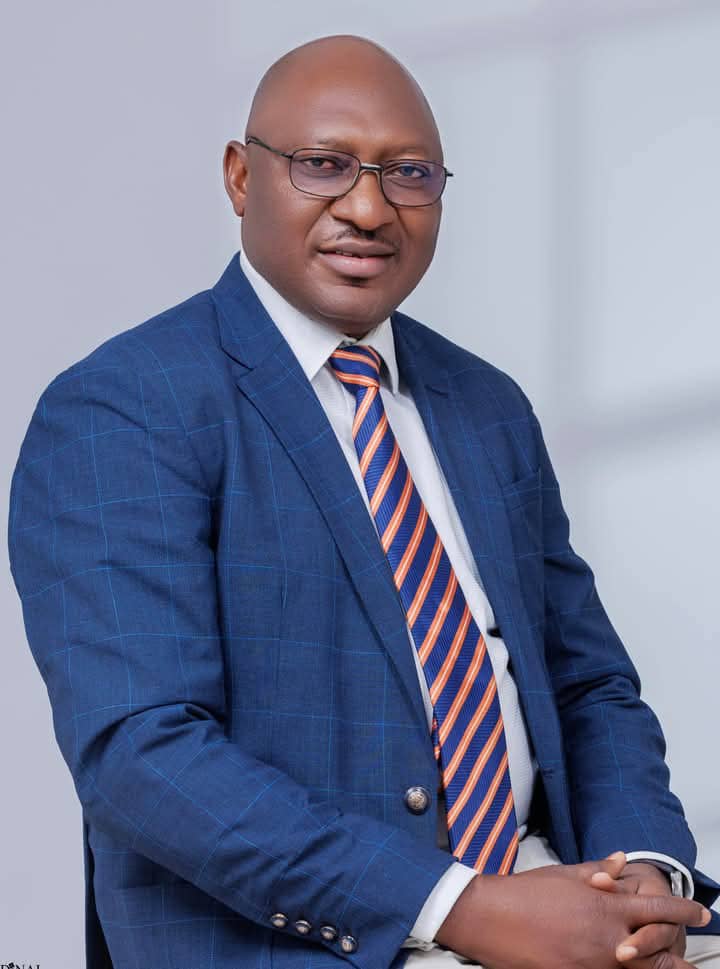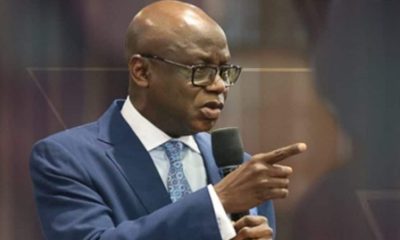Opinion
Playing games with telecom tariff hikes

By Sonny Aragba-Akpore
In what sounded like a death knell or an epilogue as we know it in literature,Association of Licenced Telecoms Operators of Nigeria (ALTON )chairman, Gbenga Adebayo, warned that “if nothing is done, we might begin to see in the new year grim consequences unfolding, such as Service Shedding; Operators may not be able to provide services in some areas and at some times of the day leaving millions disconnected, there will be significant economic Fallout, because businesses will suffer from lack of connectivity, stalling growth and innovation. There will also be national economic disruption where key sectors like security, commerce, healthcare, and education which rely heavily on telecom infrastructure, will face serious disruptions.”
This is frightening should the threat be carried out with full force.
But can the operators act unilaterally?The answer is no and that is where the game begins.
Only last week the government agreed to demands for tariff hikes in the telecommunication industry. This is expected in the coming weeks, as the government aims to address sustainability challenges in the telecom sector. This implies that prices of calls, data and SMS will go up for the average Nigerian.
However, the hike will fall short of the 100 percent increase requested by service providers, with the government seeking to balance sector growth and protecting Nigerians from excessive financial burdens.Bosun Tijani, the minister of communications, innovation, and digital economy, disclosed this during an industry stakeholder forum in Abuja on Wednesday January 8,2025.
Similarly the NCC introduced the Guidance for the Simplification of Tariffs signed out by NCC Chief on November 25,2024 stating among other things that :”This Guidance is pursuant to the regulatory powers of the Nigerian Communications Commission (Commission) under Sections 3, 108 and 109 of the Nigerian
Communications Act 2003 (Act) as well as relevant subsidiary legislations empowering the Commission in that regard. It is also in furtherance of the mandate of the Commission to regulate communications services and ensure consumer protection in the sector.
The Commission hereby issues this Amended Guidance for the simplification of tariff plans, bundles and promotional activities that include tariffs. This Guidance is designed to enhance transparency, improve consumer understanding and foster fair competition”.
It doesn’t stop there as the guidelines also elaborate on what is possible: “For the USSD platform, the following information should be included when a subscriber requests details of their tariff plan
o Name of Plan
o Validity Period (if applicable) Indicate rate per second (and rate per
minute) on-net/off-net
o Indicate rate per megabyte/kilobyte/gigabyte
o Indicate rate per SMS on-net/off-net
o The number of Add-ons subscribed to
Additional Conditions for Tariff Approvals
Operators must offer standalone data bundles, at fair prices to avoid tying consumers with products they do not need Bonuses on promotions must be stated in actual value.For all tariff plans, both the Main and Bonus accounts must deplete at rates within stipulated price floors and caps.
Bundles with shorter validity periods should be prioritized for depletion.
Options for subscribers who exhaust their bundle allowance within the stipulated
validity period should include:
o Purchase of a top-up bundle
o Purchase of a new bundle
o Switch to the default rate of his/her plan
Any Operator wishing to offer services on third-party platforms (Banking applications, etc.) at discounted rates must obtain and comply with the explicit approval received from the Commission (Hot Deals, personalized/ below-the-
line offers, Cashback etc.)
Existing personalised offers approved by the Commission can remain active for the duration of the validity period of the approval. However, the Commission will continue to monitor the market and make necessary
interventions when required.
Below-the-line/personalised offers, Fixed/Fixed Wireless Services, and Device
Financing Propositions must be presented for the Commission’s prior approval process.
No one has ever challenged the powers of telecommunications regulators,the Nigerian Communications Commission (NCC) to regulate the sector which is believed to be the engine room of the economy.
With over 14% contributions to the Gross Domestic Product’s (GDP) and one the biggest single contributors, telecommunications affects every fabric of the Nigerian life.
Understandably then, if the sector players experience haemorhage as a result of economic headwinds, then the economy is truly troubled.
The operators complain loudly that government may have decided to give out telecom services as palliative to Nigerians against the wishes of of Mobile Network Operators (MNOS) therefore suffocating their business.
They alleged that the regulator is playing games, especially against the backdrop of its inability to hearken to their cries of tariff hike.
But the regulator thinks differently as it says the Nigerian Communications Act (2003) especially sections 108 and 109 empowered it to treat such issues in that regard.
The position and powers of the regulator have never been questioned by any of the industry stakeholders. What the operators are saying, for instance, is that some of the regulations by the Commission are so stale that they have little or no impact on modern business operations that can lead to growth or renewal of the industry.
At the time, NCC lost the voice to proclaim the provisions of the Act in Sections 108 and 109 which have no tolerance for the meddlesomeness of a minister or even the President of the Republic if he wanted to supervene. The operators did not also test the provisions of the Act in the Court.
One operator confessed in trepidation that “it’s already very tough doing business in Nigeria. We don’t want the government to come after use with all its powers.”one analyst summed up the NCC imbroglio at a time a Minister,s unnecessary place in the gallery truncated the 10% tariff hike which ended up as a Greek gift .And later short lived thus creating telecommunications as palliative to subscribers who do not have an idea of what operators are living through.
Even the operators are obviously ignorant of the floor price template as another analysis summed it up:
“Once a Floor and a Ceiling have been put in place, playing wthin the band doesn’t need the approval of the NCC,” another source affirmed.
Perhaps in trying to enjoy this regulatory latitude, the operators in 2022 requested for, and got a 10 percent tariff increase on Voice and Data services from the NCC. The Commission reversed itself after a few days, saying the priority of the Minister Isa Pantami was to protect the citizens and ensure justice for all stakeholders. An NCC source told this writer that the reversal was unilaterally done by the minister who coerced the regulator to receive the fall.”
Telecom industry is under heavy burden according to ALTON Chairman, Adebayo.
Emphasizing that without the tariff review, operators cannot continue to guarantee service availability, the ALTON Chairman said though the challenges being faced by the telcos are not new, they have become more acute and more threatening with this passing year.
He noted that rising operational costs, skyrocketing energy costs, the relentless pressure of inflation, and volatile exchange rates, amongst others, have all placed an unsustainable burden on network operators.
Adebayo added that despite these mounting pressures, tariffs have remained stagnant, leaving operators trapped in a financial quagmire.
According to him, the resources needed to maintain, expand, and modernize telecom networks are no longer available and without intervention, “the future of this sector is at grave risk.”
Keeping the sector afloat
The ALTON Chairman noted that stakeholders have done their best over the years to sustain the sector by upholding the values and importance of telecommunications in society.
“However, let me be clear: our work is far from over. It is not enough to have kept the sector afloat; we must now focus on securing its future. The sustainability challenges we face today are not just a passing storm—they are a clarion call for decisive action to ensure that this industry thrives for generations to come.
Due to the increasing costs, telecom operators in Nigeria have since last year been clamouring for an increase in tariffs.
In a joint statement by the Association of Licensed Telecom Operators of Nigeria (ALTON) and The Association of Telecommunication Companies of Nigeria (ATCON), the operators said the telecom industry is the only industry that has not reviewed its prices despite the rising inflation in the country and other economic realities that warrant increment.
They blamed this on the regulatory restraints that have been preventing them from pricing appropriately.
The Nigerian Communications Commission (NCC) regulates prices in the telecom industry and telecom operators are not allowed to implement any price change without the regulator’s approval.
The regulator has said a cost-based study is being conducted to determine if it would approve price increments for the operators.
But the 2022 and 2024 proposals as announced by Toriola were truncated in August 2024 when ALTON traded off the proposals because of alleged misrepresentation saying the misrepresentation of the good intention of telecom operators to secure a slight adjustment on end-user tariff on voice calls and data services has led to the carriers slowing down on the push.
The operators, acting under the aegis of Association of Licensed Telecom Operators of Nigeria (ALTON), had sought the imprimatur of the Federal Government, via the Nigerian Communications Commission (NCC), to adjust call and data tariff to reflect cost of operation in the country.
The NCC had refused to accede to their demand, a decision insiders said was based on political expediency. In a pushback, the telcos had said their services should not be used as palliative to cushion the impact of ongoing economic hardships in the country.
In May 2022,the mobile network operators (MNOS) proposed 40% increase in tariffs.
The operators under the auspices of Association of Licensed Telecommunication Operators of Nigeria (ALTON), proposed a 40 per cent hike in call and SMS tariffs.
The operators said the decision was necessary considering the rising cost of doing business.
A letter to the NCC said the fee for calls will increase from N6.4 to N8.95 while the price cap for SMS will increase from N4 to N5.61.
The association said the telecommunications industry had been financially challenged by an economic downturn that occurred during the COVID-19 pandemic in 2020 and the ongoing Russia-Ukraine war.
ALTON added that the introduction of the five percent excise duty on telecom service providers has heightened the burden of multiple taxes and levies on the industry.
“ALTON considers it expedient for the telecommunications sector to undergo periodic cost adjustments through the commission’s intervention in order to minimise the impact of the challenging economic issues faced by our members,” it said.
“Upward review of the price determination for voice and data and SMS. Given the state of the economy and the circa 40 per cent increase in the cost of doing business, we wish to request for an interim administrative review of the mobile (voice) termination rate for voice; administrative data floor price, and cost of SMS as reflected in extant instruments.
“For data services, we wish to request that the commission implements the recommendations in the August 2020 KPMG report on the determination of cost-based pricing for wholesale and retail broadband service in Nigeria. Excerpts from the report are attached and marked ‘Annexure 2’ to provide a further illustration,” it added.
When he spoke unanimously on national tv Toriola said “We at MTN believe we need adjustment of about 100 per cent, I think the industry is pretty much aligned because we are all experiencing the same headwinds. Now, the government is very sensitive to squeezing consumers’ wallets with the pressures that have come from inflation and currency devaluation on consumers.
Toriola was very optimistic that the government of Nigeria will accede to the proposed 100% tariff increase eventually all things being equal.
Toriola carried the cross and burden of the embattled sector when he spoke on national television last week Friday.
While bragging that telecommunications had impacted positively on the economy (he was right anyway) he is worried that not much encouragement has come from government.
But that is where he miscalculated.
Although he felt justified that a tariff increase is sine quanon,there are several untapped layers of this question.
“So, I’m not sure they will give us 100 per cent, but I am optimistic they will give us something substantial and maybe progressively over the course of the year we can have smaller adjustments that will help us to get back to where we need to be,” Toriola said.
The MTN CEO said that almost every other sector in the country, including aviation and power have increased tariffs except the telecoms industry.
According to him, all the bodies that look into the statistics of the telecoms industry globally have disclosed that Nigeria has probably the second or third lowest tariffs in the world on data as well as on voice.
If Toriola and his strange bedfellows return to the Floor price determination of 2016 and 2020 and the various studies carried out in that regard ,he will see a number of windows that could address the nightmare and save both the regulator Nigerian Communications Commission (NCC) and the rest of us these agonizing times.
Strangely,non of the operators has hit the maximum threshold of 50 naira per minute because of the competition to outdo each other by playing to the gallery in order to play smart and scurry subscribers attentions.
Opinion
Hon. Prof Nnamchi’s Low Social Media Presence Doesn’t Define His Output- A Reply To X User’s Observation

By Titus Agbo
A user on X, formerly Twitter, named Mechelito@Onyema_7, claimed that Hon. Professor Paul Sunday Nnamchi, the member representing of Enugu East/Isi Uzo Federal Constituency in the House of Representatives doesn’t post about the insecurity issues in Eha-Amufu and his efforts to impact his constituents on his X handle, @sunday_nnamchi. The user supported his claim with a screenshot of Nnamchi’s X account page.
However, it’s worth noting that Professor Nnamchi’s low online presence doesn’t necessarily reflect his efforts and output. He was raised by Catholic priests and has a humble disposition. Before venturing into politics, he was involved in humanism, providing free computer training to students in his local government area, Enugu East. This initiative, which aims to expose students to information and communication technology (ICT) education, has trained over 2,000 students as he has since expanded it to accommodate his constituents from Isi Uzo immediately he was elected into the National Assembly.
# Key Achievements
-Scholarships*: Nnamchi has offered scholarships to hundreds of indigent students from various communities within the constituency, including non-indigenes residing in Enugu East/Isi Uzo. Sewed school uniforms for pupils in primary schools and facilitated employments for a few constituents.
– *Infrastructure Development*: He deployed ₦300 million worth of solar-powered streetlights to communities in Enugu East Local Government Area last year and plans to replicate same in Isi Uzo this 2025.
– *Education and Healthcare*: Nnamchi has built and renovated classroom blocks, provided medical outreach programs, and offered free medical treatments and medications to constituents who couldn’t afford them.
– *Security*: He raised a motion on the Eha-Amufu killings on the floor of the House of Representatives on the 19th December, 2023 prompting the House to urge the Inspector-General of Police and the Chief of Army Staff to deploy adequate security personnel to Eha-Amufu and also directed the National Emergency Management Agency, (NEMA) to provide relief materials to the affected victims.
Professor Nnamchi also issued a strongly worded press statement in December 2024 reminding the relevant security agencies of the need to step up their operations in Eha-Amufu. The motion and the subsequent press statement issued the following year when the hoodlums struck again in 2024 were widely reported by both online and major newspapers as can be observed with a few examples of the publications below.
– “Lawmakers Seek Urgent Action To Address Insecurity In Enugu State” by Gloria Essien, Abuja (Voice of Nigeria online, December 4, 2024)
– “Enugu attacks: Reps urge FG to intensify efforts against insecurity in S/E” (Vanguard Newspaper, December 4, 2024)
– “Task FG to address insecurity in South East” by Ndubisi Orji (Sun Newspaper, December 5, 2024).
Nnamchi has sponsored 36 establishment and amendment Bills and numerous motions as at March 2025. The Order Paper, an authoritative in-house journal of the National Assembly, adjudged him the most performing legislator from the Southeast in 2024 ¹.
I want to assure the above X user that all Hon Professor Nnamchi’s social media accounts will be put into proper use henceforth to keep constituents like him updated with Professor Nnamchi’s legislative and constituency engagements.
Titus Agbo, a public affairs analyst wrote from Enugu
Opinion
5G,IoT and AI to boost global GDP by 2030

By Sonny Aragba-Akpore
With Mobile technologies and services now generating around 5.8% of global Gross Domestic Product (GDP) a contribution that amounts to about $6.5 trillion of economic value, there are strong projections that by 2030, this figure will rise to almost $11 trillion, or 8.4% of GDP.
Global System of Mobile Communications Association (GSMA) says much of this will be driven by countries around the world increasingly benefiting from the improvements in productivity and efficiency brought about by the increased take-up of mobile services and digital technologies, including 5G, Internet of Things (IoT) and Artificial Intelligence (AI).
The GSMA recently introduced the 5G Connectivity Index to provide insights into 5G performance in 39 markets in order to encourage informed decision-making.
In terms of Economic Impact,
the GSMA emphasizes the economic benefits of mobile technologies and services, including 5G, projecting that they will contribute significantly to GDP growth by 2030.
“The GSMA provides specific reports and analyses on 5G in different regions, such as Sub-Saharan Africa, Asia ,Middle East among others highlighting the progress and challenges of 5G deployment in specific areas.”
In Sub Saharan Africa for instance with particular attention on Nigeria,South Africa,Egypt,Kenya and Botswana among others some measure of progress in deployment has been recorded.
The rollout of 5G has brought immense benefits across multiple industry sectors, particularly those involving internet of things (IoT) and artificial intelligence (AI) applications in which the real-time transfer of data is crucial.
More broadly, the adoption of 5G is expected to accompany increased data use across the globe, with forecasts anticipating mobile data traffic of over 300 exabytes per month by 2030, more than twice the volume consumed in 2024 according to Statista.
And with a third of global population expected to be covered by this fifth generation (5G) networks ,a technology that has defined new ways of communication by 2025 ,GSMA
says the technology has surpassed growth projections of all times.
“5G subscriptions increased by 163 million during the third quarter 2024 to total 2.1 billion. 5G subscriptions reached close to 2.3 billion by the end of 2024 accounting for more than 25 percent of all global mobile subscriptions.
“4G subscriptions continue to decline as subscribers migrate to 5G” according to GSMA.
As of the first quarter of 2024, there were nearly two billion 5G connections worldwide, with 185 million new additions. This is expected to grow to 7.7 billion by 2028.”
Statistics show that 5G is the fastest-growing mobile broadband technology, reaching 1.5 billion connections by the end of 2023.
It only took four years to reach this number, compared to 10 years for 3G and more than five years for 4G.
“5G is more than a new generation of technologies; it denotes a new era in which connectivity will become increasingly fluid and flexible.5G Networks will adapt to applications and performance will be tailored precisely to the needs of the user” GSMA submits.
By covering one-third of the world’s population , impact on the mobile industry and its customers will be profound according to GSMA.
To deepen the spread of 5G ,GSMA is working closely with the mobile operators pioneering 5G, “by engaging with governments, vertical industries including automotive, financial services, healthcare providers, transport operators, utilities and other industry sectors to develop business cases for 5G.”
And In order to accelerate the growth and spread, many operators are said to be deploying
AI technology as part of an integral part of telecoms operators’ strategic and operational plans.
“Operators are making important advancements in the deployment of AI technology, which is serving as a transformative force shaping the telecoms industry. By deploying autonomous AI-based systems, operators can enhance operational efficiency, customer satisfaction and security, while also creating new revenue opportunities”.
China, South Korea, the United Kingdom, Germany, and the United States are the leading countries with robust 5G coverage in the world.
Since the first commercial launches of the fifth generation of mobile networks in late 2018, these five countries have emerged as leaders because multiple companies in these countries have deployed networks and are selling compatible devices. Countries including Switzerland and Finland are up and comers in 5G development, though they have limited deployment.
In China there are three Companies leading in deployment.
The world’s largest 5G network was launched by the three largest Chinese network operators Oct 31, 2019, according to the state-run news agency Xinhua. These are China Mobile, China Unicom, and China Telecom which all activated their networks in less than five months after they were issued 5G licenses.
Each of the network operators offered their 5G services at $18 per month in 50 Chinese cities at the beginning of the launch.
GSMA expects 36% of China’s mobile users to be using 5G by 2025. That’s about 600 million subscribers, who would also make up 40% of the entire global 5G market by this year.
This is all despite efforts made by the United States government to hamper the progress of Chinese vendors, though those efforts may affect how Chinese companies may expand into the global market.
In South Korea,SK Telecom and Korea Telecom run as the main competitors for the South Korean 5G market.
SK Telecom acquired spectrum in the 3.5 GHz and 28 GHz frequencies to prepare for deploying 5G.
In April of 2019, the Enterprise claimed to be the first mobile carrier in the world to launch 5G services to work on 5G smartphones. SK Telecom asserted an edge over rival Verizon, as the former launched 5G services available at the same time as Samsung Galaxy S10 5G smartphone launched in South Korea. Verizon launched mobile 5G services in the U.S. before a 5G enabled smartphone was available to U.S. consumers.
SK Telecom also conducted tests with a 5G Standalone (SA) Core (a core not reliant on the 4G network) for their 5G network in cooperation with Samsung Electronics.
The world’s largest 5G network was launched by the three largest Chinese network operators Oct 31, 2019, according to the state-run news agency Xinhua. These are China Mobile, China Unicom, and China Telecom which all activated their networks in less than five months after they were issued 5G licenses. Each of the network operators offered their 5G services at $18 per month in 50 Chinese cities at the beginning of the launch.
“What we are seeing is a concerted effort by the Chinese — the operators, vendors, and government regulators — to deploy 5G as quickly as possible,” Chris Nicoll, principal analyst at ACG Research, pointed this out in a November 1, 2019 SDxCentral article.
With all of these players working together, the three network operators had collectively deployed nearly 86,000 5G base stations peaked over 130,000 by the end of 2019. The latter number breaks down into China Unicom and China telecom, with each planning to install 40,000 base stations, and the market leader China Mobile to install 50,000.This was the projection by 2019 but they have since overshot this by the beginning of 2024.
The International Telecommunication Union (ITU), says 5G coverage reached 40% of the world’s population in 2023 with an uneven coverage and distribution with developed countries having more coverage than low-income countries:
In Europe ,68% of the population is covered and
Americas had 59% of the population covered while
Asia-Pacific has 42% of the population covered as at 2023.
Arab States have 12% of the population covered.
Commonwealth Independent of States (CIS) had 8% of the population covered.
ITU figures show Africa,s coverage rose to 10 % of the population by 2023 .
The ITU also notes that 90% of the world’s population is covered by 4G, but 55% of people without access to 4G live in low-income countries because In low-income countries, 3G is often the only technology available to connect to the Internet.
The ITU develops and adopts international regulations and global standards to enable the harmonization and implementation of broadband mobile networks.
In Africa, around a dozen nations have launched services including Botswana, Kenya, Mauritius, Madagascar, Nigeria, Seychelles, South Africa, Tanzania, Togo, Zimbabwe, and Zambia but Africa is a patchwork of 54 countries.
And penetration is predicted to be slow.
By 2027, Ericsson predicts that 80 percent of phone users in Europe will have 5G service.
At the same time, 5G subscriptions in Africa, home to 1.4 billion people, May stagnate at a little over 10 percent. Why will so few people in Africa get access to 5G services?
China, South Korea, the United Kingdom, Germany, and the United States remain the leading countries with robust 5G coverage in the world.
While many countries are already providing robust services,Africa remains on the outskirts of 5G services.
The countries in Africa that have launched 5G networks, include South Africa with its roll out
In March 2022, when the Independent Communications Authority of South Africa (ICASA) sold spectrum across several bands.
In Nigeria,MTN rolled out commercial 5G services in Lagos in 2022, with other roll out in Abuja, Port Harcourt, Ibadan, Kano, Owerri, and Maiduguri among others.
MTN Congo announced that it was the first country in Central Africa to deploy 5G.
In Botswana Orange deployed 5G technology to provide new services in the Gaborone and Francistown regions.
Other countries in Africa that have launched 5G Fixed Wireless Access (FWA) services include: Angola, Kenya, Zambia, and Zimbabwe.
Analysts say “5G’s potential is growing due to its ability to deliver fiber-like speeds. However, there are still challenges in the region, such as:
Urban areas are reaching their maximum capacity whereas a large portion of the population lives in rural areas.
This explains why 5G adoption in the sub-Saharan region is currently below six percent “
Analysts report that 5G deployment in Africa faces many challenges, including Spectrum assignment,regulatory issues,infrastructure,security,financial resources among others.
“Spectrum is a limited resource that is already in use by other services, such as TV broadcasters and satellite operators. Governments need to open up frequencies and grant 5G licenses at reasonable prices. “
Infrastructure is another major challenge.
“5G networks require a large initial investment, including expensive devices, antennas, and Radio Access Network (RAN) hardware. The infrastructure needs to be fiberized to support 5G services.
Regulatory conditions also serve as challenges to deployment.
For instance “regulatory authorities may not have started the process for licensing and granting frequencies in the right portion “
“Most of the equipment and devices required for 5G deployment need to be imported.”
There are also security challenges that make
5G technology vulnerable to cyber security threats, such as tracking calls and exposing user locations.
Opinion
Right of Reply: THE PUNCH AND BUSYBODY BUSINESS

The recent declaration of a State of Emergency in Rivers State has triggered diverse commentaries from a wide range of Nigerians.
Almost everyone hailed the presidential proclamation because of the visible threat to law and order in the state at the time the action was taken. Of course, there were a few naysayers who read political meanings into an otherwise sincere and prompt intervention.
One such negative interpretation is the position taken by the Editorial Board of The Punch newspaper. In one of its editorials published on the matter, the national daily claimed that the entire crisis was caused by what it described as “the needless meddlesomeness in the governance of the state by its former governor and Tinubu’s Federal Capital Territory Minister, Nyesom Wike….” It is unfortunate that this narrative and others like it have become commonplace in the media space.
How did the Editorial Board of a reputable newspaper arrive at such a conclusion? Their claim that the Sole Administrator, Admiral Ibok Ete Ibas (rtd), has been acting a script purportedly written by the Minister of the Federal Capital Territory, Nyesom Wike, is also faulty and has no iota of truth.
They also faulted the sacking of all political appointees who served in Governor Siminalayi Fubara’s administration, insinuating that their replacements were drawn from Wike’s political camp. Again, nothing can be further from the truth.
Since his appointment as the Sole Administrator of Rivers State, Admiral Ibok Ete Ibas has been running the state with the abundant human resources available in the state and has not imported anybody from outside the state. Did the Editors of The Punch really expect him to run the administration with the politicians loyal to the suspended governor?
Do they not know that the crop of political appointees who served Fubara would have found it difficult to work with the Sole Administrator?
Certainly, they know the truth, but they have chosen to stoke the fire to generate more tensions in Rivers State.
Certain interests might have commissioned this editorial to cast aspersions on the Sole Administrator and raise doubts about his capacity to run the state.
It may also have been the handiwork of Wike’s political detractors, the man whom many politicians love to hate for no other reason than envy and jealousy.
We urge the Punch newspapers to seek a better mode of intervention in the political situation and not dwell on innuendos and unsubstantiated allegations against certain political actors in order to blackmail them.
Dr Ike Odogwu
-

 News11 hours ago
News11 hours agoBREAKING! Pope Francis is dead
-

 News8 hours ago
News8 hours agoUPDATED: How Pope Francis transited, last activity, health challenges, others
-

 News15 hours ago
News15 hours agoRetirees with outstanding loans may lose property – FG
-

 News16 hours ago
News16 hours agoSad as hotelier slumps, dies at wife’s 60th birthday thanksgiving
-

 Metro16 hours ago
Metro16 hours ago77-year-old Nigerian Uber driver shot dead in US, passenger in critical condition
-

 News11 hours ago
News11 hours agoFemi Ojudu: We Understand His Bitterness Being A Political Coupist– Lere Olayinka bombs Ojudu over comment on wike
-

 News16 hours ago
News16 hours agoBakare criticizes Tinubu, says his ‘motor park’ politics has destroyed NASS
-

 Politics11 hours ago
Politics11 hours agoSenate postpones resumption of plenary sittings to May 6

















